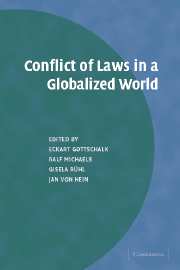Conference: PIL and Protection of Foreign Investors
University of Montenegro Faculty of Law in Podgorica, with the support of the GTZ organize the Fifth Annual Conference: “Private International Law and Protection of Foreign Investors” (Me?unarodno privatno pravo i zaštita stranih investitora).
The program includes the following speakers and topics:
Maja Stanivukovi?: Clause Concerning the Observation of All Commitments which the State Assumes Towards the Foreign Investor (the Umbrella Clause) in Bilateral Investment Protection Treaties (Klauzula o ispunjenju svih obaveza koje je država preuzela prema stranom ulaga?u (kišobran klauzula) u dvostranim ugovorima o zaštiti investicija)
?or?e Krivokapi?: Some Modern Clauses in Investment Agreements (Neke moderne klauzule u investicionim ugovorima)
Uglješa Gruši?: Effects of Choice of Court Clauses in European, English and Serbian Law (Dejstvo prorogacionih sporazuma u evropskom, engleskom i srpskom pravu)
Mirela Župan: Widening Party Autonomy to Non-State Law (Širenje strana?ke autonomije na izbor ne državnog prava)
Ivana Kunda: Internationally Mandatory Rules: Defining their Notion in European Private International Law (Me?unarodno prisilna pravila: odre?enje pojma u europskom ugovornom me?unarodnom privatnom pravu)
Bernadet Bordaš: Certain Issues of Resolving Investment Disputes as an Investor Protection Instrument (Neka pitanja rešavanja investicionih sporova kao instrumenta zaštite investitora)
Vesna Lazi?: Suitability of the UNCITRAL Arbitration Rules for the Settlement of Investment Disputes
Michael Wietzorek: Arbitration of Investment Disputes
Toni Deskoski: The Importance of the Right to be Heard in International Arbitration Proceedings
Vladimir Savkovi?: Internet Arbitrations as a Model for Resolving Disputes Arising Out of the Electronic Contracts – Pros and Cons (Internet arbitraže kao model za rješavanje sporova proizašlih iz elektronskih ugovora – pro et contra)
Christa Jessel Holst: The Directive 2005/56/EC of 26 October 2005 on Cross-Border Mergers of Limited Liability Companies and Its Implementation in Member-States with Restrictions in the Legal Transactions of the Real Properties
Vlada ?olovi?: The Status of Foreign Investors in Domestic Insolvency Proceedings (Položaj stranih investitora u ste?ajnom postupku na doma?oj teritoriji)
Milena Jovanovi?-Zattila: Investor Protection on the Capital Market (Zaštita investitora na tržištu kapitala)
Davor Babi?: Law Applicable to Takeover of Joint Stock Companies (Pravo mjerodavno za preuzimanje dioni?kih društava)
Predrag Cvetkovi?: International Legal Regime for Foreign Investments: The Role of the World Trade Organisation (Me?unarodno-pravni režim stranih ulaganja: o ulozi i zna?aju Svetske trgovinske organizacije)
Valerija Šaula: On the Occasion of a Decision of the Constitutional Court of Bosnia and Herzegovina – The Issue of Service Being Made Abroad as a Condition for Recognition of a Foreign Judgement (Povodom jedne odluke Ustavnog suda Bosne i Hercegovine-Problem dostavljanja u inostranstvo kao uslov za priznanje presude stranog suda)
The conference is to be held from 18 to 20 October 2007 in the Hotel Bellevue Iberostar in Be?i?i (Montenegro). The proceeds from the conference will be published by the Faculty of Law in Podgorica.
The contact person is:
Professor Dr. Maja Kosti?-Mandi?
Faculty of Law
Ul. 13. jula br. 2
81 000 Podgorica
Montenegro
tel: +381 81 481 110
e-mail: majak@cg.yu
 Cambridge University Press have published a new book on
Cambridge University Press have published a new book on  The contributors:
The contributors: Nikiforos Sifakis has written an article in the latest issue (Vol. 13, Issue 2, 2007) of the
Nikiforos Sifakis has written an article in the latest issue (Vol. 13, Issue 2, 2007) of the